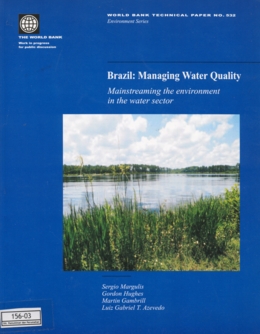|
 This study reviews how environmental issues have been addressed in the water sector in Brazil, within the context of activities of the Federal Government, generally, and those implemented under Bank sector operations more specifically. The core focus of the study lies in the management of water quality, as it affects both the users of raw water and those who are primarily concerned with the disposal of wastewater. The report considers the following three sectoral areas concomitantly - water resources management, water supply and sanitation, and the environment -thus limiting its review and focus to those themes which are key to the over-arching issue of water quality. The management of water resources in Brazil, as in many other developing countries, has relied upon heavy investments in medium and large scale projects and programs to provide basic infrastructure for the different services related to water use. Historically, there has been a strong tendency to favour large, highly visible projects, which have shown disappointing overall returns, have resulted in little improvements in water quality, and have produced questionable impacts in terms of reducing poverty and inequality. One of the key reasons for such results has been the poor management of the installed infrastructure, the importance of which has been largely underestimated. Improving the utilization of existing infrastructure is therefore seen as being critical to achieving significant and rapid progress throughout the water sector. This needs to be complemented by adequate incentives to both service providers and water users to make more efficient use of the infrastructure and the resource itself. The low economic, environmental and social returns generated by investments in the water sector also reflect the systematic tendency to pay insufficient attention to overall objectives in the design and implementation of programs and projects. If the improvement of water quality in Brazil is an issue that is to be taken seriously, then a first step should be to undertake a proper assessment of water quality goals for each river basin in the country. The current classification of these goals seems to be arbitrary, and should, instead, be based on a systematic evaluation of the costs and benefits of setting and reaching alternative standards, as well as on explicit social objectives such as expanding service provision and service quality to the poor. Table of Contents: Note on the English Version 1. Introduction Post Date : 23 Juli 2010 |